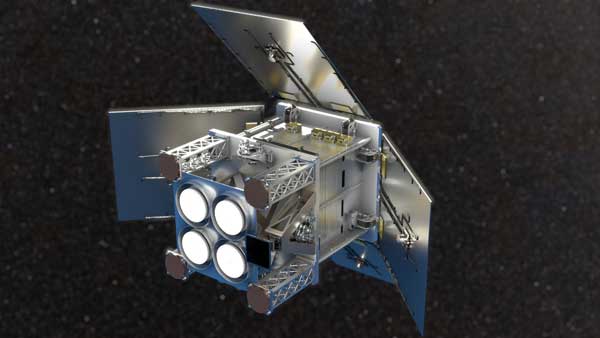PARIS (ESA PR) — Today, as Φ-week gets underway, ESA has signed a contract with Surrey Satellite Technology Ltd to build the HydroGNSS Scout mission. Embracing the concept of New Space, HydroGNSS is a micro satellite that will use a technique called Global Navigation Satellite System (GNSS) reflectometry to measure climate variables such as soil moisture, freeze–thaw state over permafrost and inundation.
The contract, worth €24 million, was signed by ESA’s Acting Director of Earth Observation Programmes, Toni Tolker-Nielsen and Managing Director of Surrey Satellite Technology Ltd, Phil Brownnett.
Complementing ESA’s series of Earth Explorer research missions, Scout missions are a new element in ESA’s Earth Observation Future EO Programme.
The aim is to demonstrate the capability of small satellites to deliver value-added science, either by the miniaturisation of existing technologies or by demonstrating new sensing techniques.
A Scout mission consists of one or several small satellites that can rapidly prototype and demonstrate novel ways of observing Earth from space. They should also demonstrate key value to Earth science and practical applications, while retaining the potential to be eventually scaled up to larger satellite missions
Adopting this agile New Space development process, the goal is to implement a Scout mission, from kick-off to launch, within three years, and for a maximum of €30 million. This budget includes the development of the space and ground segments, launch and in-orbit commissioning.
Toni Tolker-Nielsen said, “The Scouts are complementary to the science-driven Earth Explorers. They are characterised by an agile and low-cost development process to prove new concepts for future ESA endeavours, and to timely add scientific value to current data through supplementary observations.
“We are extremely happy to sign this contract today with Surrey Satellite Technology and look forward to this novel new mission becoming a reality.”
Jean-Pascal Lejault, ESA’s Project Manager for the Scout missions, added, “HydroGNSS will use GNSS reflectometry for observations of essential climate variables relevant to the hydrological cycle. These variables include soil moisture, freeze–thaw over permafrost, above-ground biomass and ocean-wind speed. It will consist of one micro-satellite, and one additional satellite as an option.
“Compared to previous GNSS reflectometry missions, HydroGNSS is unique in that it will have new capabilities and features with dual polarisation, coherent channels and dual-frequency, enabling high coverage and resolution. It will complement other missions sensing soil moisture such as ESA’s SMOS and Biomass, Copernicus Sentinel-1 and NASA’s SMAP.”
Phil Brownnett commented, “We are very pleased to secure a contract with ESA for our HydroGNSS satellite which combines a low-cost small satellite with an innovative GNSS reflectometry payload, helping to tackle the global challenge of climate change and delivering the UN Sustainable Development Goals by providing valuable hydrological data. This key climate variable data will help scientists understand climate change and contribute towards weather modelling, ecology mapping, agricultural planning and flood preparedness.”
– Advertisement –
